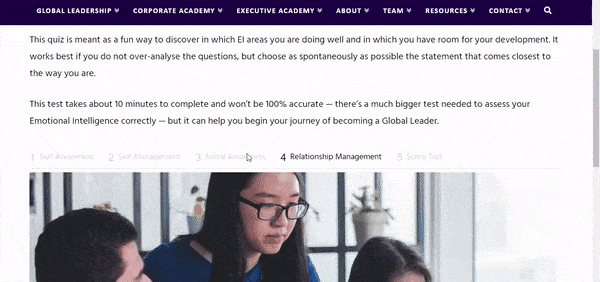Only a third of leaders are effective in leading across countries and cultures.
A Case Study of Global Leadership Development Best Practice
This is one of the conclusions A Case Study of Global Leadership Development Best Practice arrives at – and it’s a pretty shocking one, considering the fact that companies are becoming increasingly multi-national.
It’s one of the reasons why the topic of “global leadership” is on the rise and why multi-national companies are investing in developing and retaining global leaders. But what exactly is a global leader? And why is global leadership such a trend these days, when globalization itself has been unfurling across the world for several decades?
In this article, we want to take a closer look at exactly those questions and explain why effective global leadership is becoming increasingly important today – and how you can ensure it in your own company.
What is global leadership
Let’s define global leadership right off the bat, so we all have the same understanding as we move forward. Global leadership means leading in a global context or environment.
More specifically, global leadership is defined as “the processes and actions through which an individual influences a range of internal and external constituents from multiple national cultures and jurisdictions in a context characterized by significant levels of task and relationship complexity”.
In this respect, global leadership goes beyond domestic, expatriate, and comparative leadership, as well as global management, or simply a global title. Rather, global leadership becomes “extreme leadership”.

Why global leadership is trending
Why does anything trend in the first place? People’s preferences and actions are influenced by social dynamics. At least a quarter of a population is needed to elevate a topic from “hipster trend” to mainstream.
While this rings true for trends in consumerism or subconscious interactions, the world of business includes another factor: a trend will adapt faster when it consist of a new and better way of doing something — meaning it becomes faster, cheaper, more efficient or more effective.
For multi-national companies, traditional leadership is slow and expensive to adapt because it doesn’t allow for cultural barriers that cause misunderstandings and miscommunications. Global leadership, by definition, doesn’t just take these cultural barriers into account, but strives to us them to its advantage by building on the different strengths each member brings to a team.
The importance of global leadership
According to Ghoshal and Bartlett, “the global business manager’s overall goal is to capture the full benefit of integrated worldwide operations”. In a world that is increasingly at odds when it comes to ideology, religion and politics, business operations continue to span the globe. Executives still have to figure out how to run them efficiently and well.
This is only possible with global leadership, which
- enables people to lead in complex, cross-border, multicultural environments,
- builds and coordinates culturally diverse and geographically dispersed teams,
- integrates national and host cultures,
- leverages cultural diversity and reduces cross-cultural inefficiency,
- achieves sustainable growth and profitability while contributing to people’s overall well-being, and • works with difficulties of being flexible and adaptable as they broaden their global footprint.
More than any other option, global leadership has been identified as a key factor for global success. Companies (and business schools) still struggle to adequately prepare enough global leaders.
A Case Study of Global Leadership Development Best Practice, the case study mentioned earlier, involving over 13,000 global leaders and more than 1,500 HR executives within over 2,000 multi-national companies in 48 countries, also found that
- only one in five organizations emphasizes global leadership development, and
- of the 52% of multi-national companies planning to expand their operations in the next few years, only 16% reported having enough global leaders to fill critical roles.
Experts agree that global leaders are in high demand but in short supply – as of yet. To be a successful and effective global leader, you must bring certain traits to the table; competencies that some leaders innately possess and others acquire through training.

The competencies of successful global leaders
Successful global leaders of today develop certain core competencies that allow them to not only navigate the pitfalls of multi-national companies and teams, but thrive in and lead them competently.
These competencies includes
- global business expertise,
- organizational acumen,
- interpersonal skills (for example active listening, teamwork, responsibility, dependability, patience, flexibility, motivation and empathy),
- intrapersonal skills (for example self-esteem, ‑confidence, and ‑discipline, open-mindedness, awareness of one’s own thoughts, recognizing negativity, positive decision making)
- intercultural competency (for example mindfulness, cognitive flexibility, tolerance for ambiguity, behavioral flexibility, cross-cultural empathy)
Do you want to know how good your interpersonal and intrapersonal skills are — and thus if you are fit to become a Global Leader? Take the test:
Granted, global leaders sound a lot like proverbial unicorns; like those types of people who are competent in every aspect of leadership, to truly make it work. Who can ever live up to that?
Which is exactly the reason why global leadership is trending and why successful global leaders aren’t found on every street corner just yet. But they do exist, and not all of them were born with that inherent instinct of how to lead people and businesses successfully on a global scale. Many of them learned from and trained with other successful global leaders – and at leadership academies like ours.
At eurac, we support C‑Levels and Top-Executives leading multi-national companies. We support them in building efficient global teams and creating successful global organizations. Learn how in our weekly emails:



